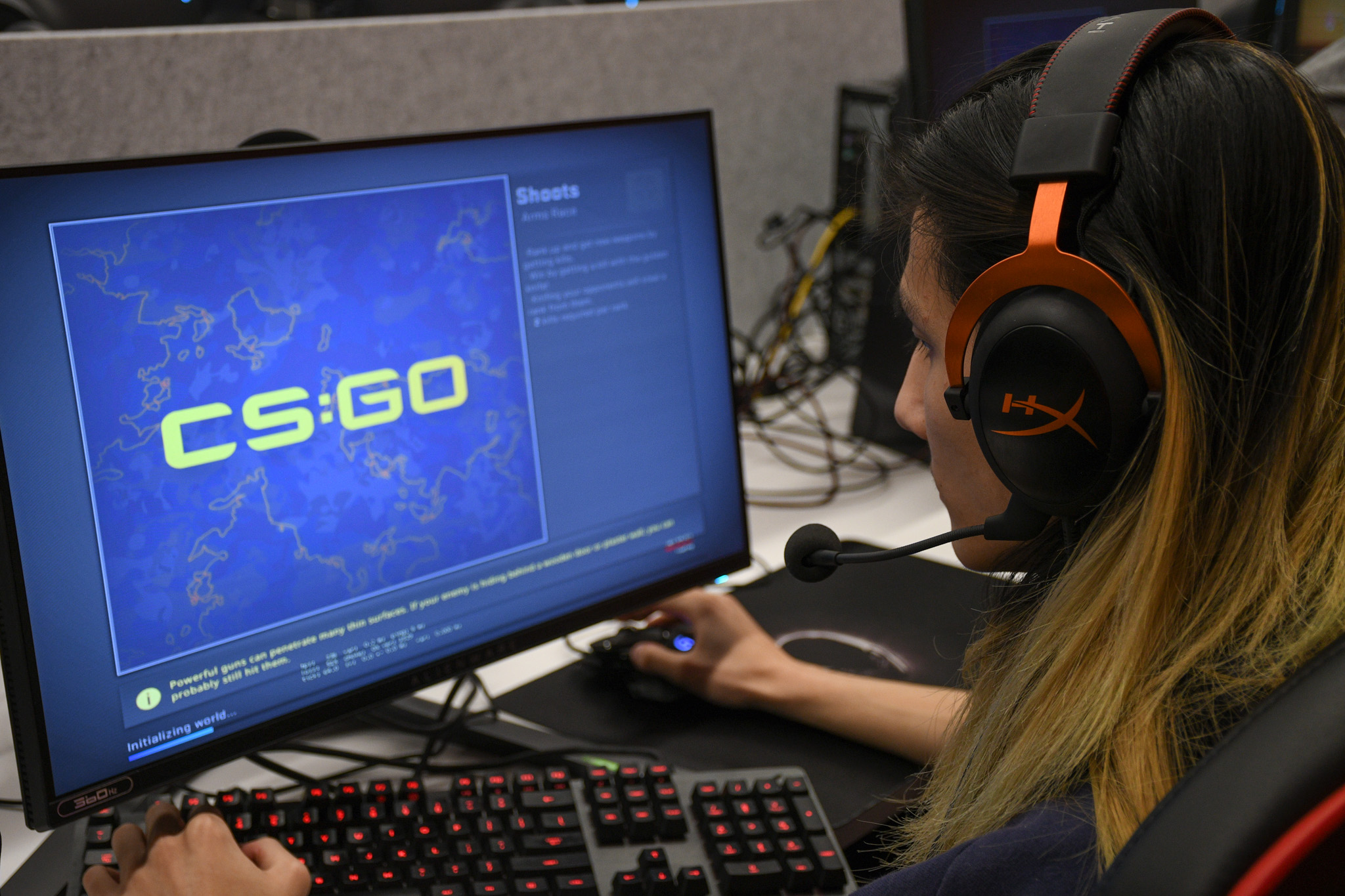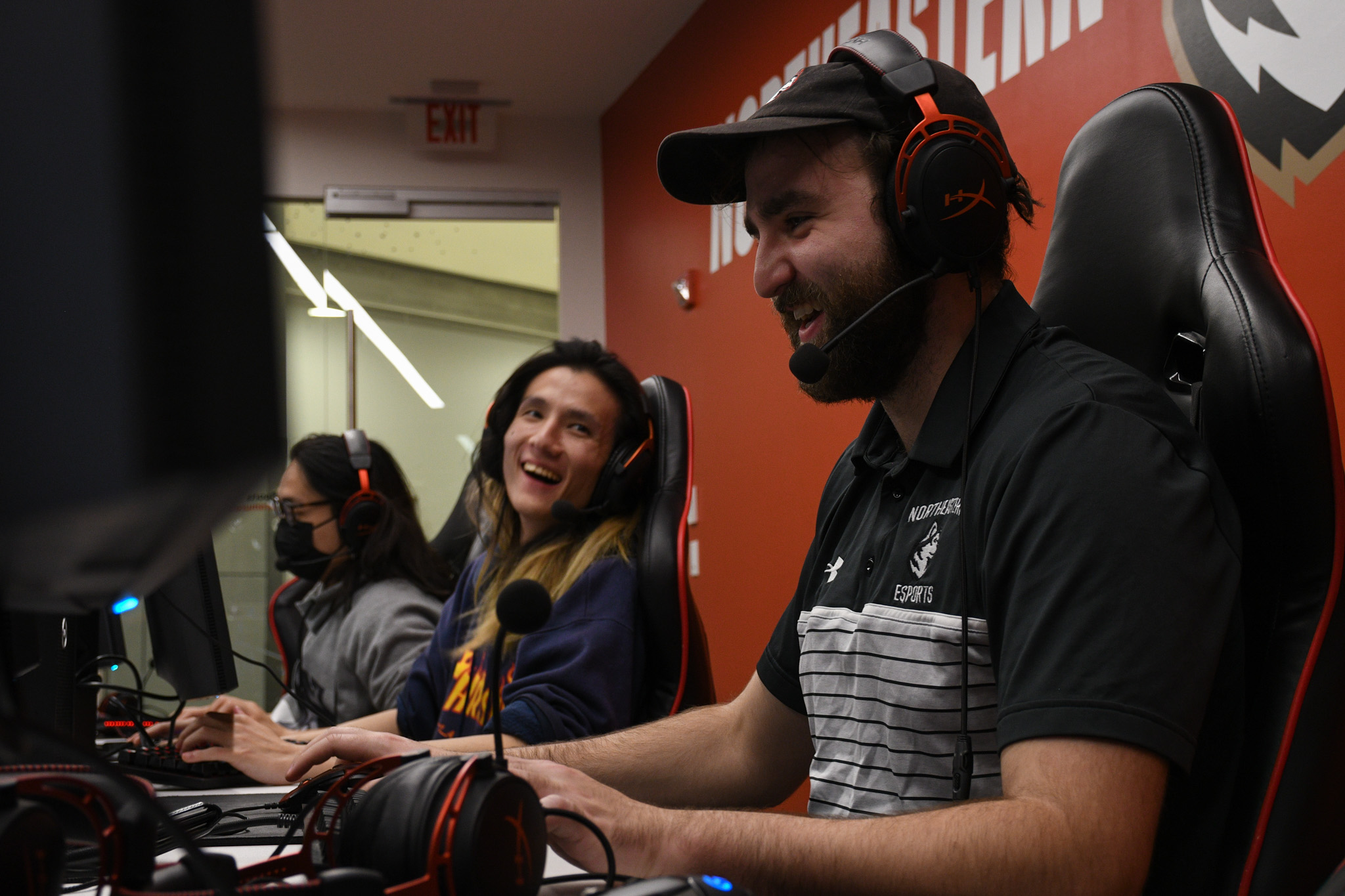
(Front to back) Counter-Strike: Global Offensive club team members Aaron Cai, Cody Ye and Captain Ethan Rush play Counter-Strike at a team practice Nov. 1. Zac Allor, coordinator of esports for Northeastern, said a varsity Counter-Strike team is not impossible, but is unlikely to happen soon.
Ask The News: Will Counter-Strike ever be a varsity esport?
Nov. 28, 2022

Counter-Strike: Global Offensive club team member Cody Ye, a second-year business administration and economics combined major, boots up the game at a team practice Nov. 1. Counter-Strike is one of 11 games represented in Northeastern’s club esports teams; the university has five varsity teams.
This article was produced as part of an initiative we’re calling Ask the News in which Northeastern University community members can submit questions to us and, if it seems like we can put together a story based on it, we look into the answers. This article was written in response to the question “Will varsity esports ever include Counter-Strike?”
Want to listen to this story? Listen here for an audio report (6min 29sec)
Some of Northeastern’s varsity athletes take to the ice, others throw and catch balls, but none of them try to defuse bombs — and for now, it is going to stay that way.
Northeastern’s co-ed esports program currently includes five games as part of its varsity level and 11 games at the club level. Counter-Strike: Global Offensive, or CS:GO, a first-person shooter game in which two teams of five compete to defuse bombs, is currently represented as a club sports team, but not as a varsity team.
Zac Allor, coordinator of esports for Northeastern, said the university could eventually include CS:GO as one of its varsity titles, but players should not expect it to be added soon.
“The university and the athletic department have a vested interest in keeping our esport team competitive, and part of that vision for them is being part of an existing athletic conference,” Allor said.
Of the five titles that the varsity program includes, four of them — League of Legends, Overwatch, Rocket League and Valorant — are all represented in Esports Collegiate, or ESC, the conference in which Northeastern’s varsity teams compete.
The one outlier, Hearthstone, is a holdover from when the esports program was first elevated to the varsity level, and the Northeastern Hearthstone team was winning national titles.
“When the esport program was generated and the initial proposal was put out there to have varsity esports, our Hearthstone program was one of the top ones in the country coming off of a national title,” Allor said. “So, they were selected at that time to be a varsity team. At this time, whether or not that same decision would have been made or if we would have stuck more one-to-one with what the ESC offers, who knows? But we’re happy with where we’re at for now.”
Mike Vuraich, executive director of ESC, said the conference considers which games to sponsor using five criteria encompassing everything from popularity, to social responsibility, to logistics like whether or not the conference can license the game when necessary. Once sponsored, the titles are reassessed each year, at the end of the season, to determine if it makes sense from a conference perspective to continue playing that game.
Ethan Rush, captain of Northeastern’s club CS:GO team, said he would like to see the addition of a varsity team, for the recognition if nothing else.
“Varsity comes with, if nothing else, just the name, you know, it’s obviously a big upgrade in recognition from clubs sports, you know, if you tell your parents you’re on a varsity athletics team, that kind of registers compared to club sports.” said Rush, a fifth-year computer engineering and computer science combined major.
He said other perks of varsity status, like scholarships and access to Cabot gym, would be welcome additions.
Despite the differences between esports and physical sports on the Northeastern varsity roster, Rush said he still thinks esports count as sports worthy of varsity status.
“Obviously, you can’t pretend that there is a physical aspect to esports; I mean, being physically healthy is important, but it doesn’t do that much in the server, but, in every other aspect?” Rush said. “It is absolutely competitive, very teamwork-heavy, communication-heavy, it definitely takes skill — I mean, it’s not just mashing buttons. It’s in every way a competition at least. Comparing sports is never a great thing, but you know, when there’s things like poker and stuff on ESPN, it’s hard to argue that esports isn’t as deserving to be out there.”
If Northeastern were to create a CS:GO varsity team, both Allor and Rush said they hope that it would supplement, rather than replace, the club team. Currently, all varsity esports at Northeastern have a club-level equivalent. In those cases, the club-level team often serves as a springboard for players to eventually join the varsity team.
“Almost the entirety of our varsity team roster worked their way up through the club teams, whether that is a semester there before they got the chance to try out or some of them don’t make varsity until their junior, senior, fifth year on the team,” Allor said.
Rush said, if both existed, he would see a club CS:GO team as a clear path to a varsity team.
“I see it as like a great progression system. You know, joining a club sports team is kind of like being [in] the JV lineup. It’s just as competitive; you’re just as focused on improving your skills,” Rush said. “When varsity needs a new player — somebody graduates or, I don’t know, gets tired of the game or whatever, a PC breaks — a JV player, or clubs sports in this case, can be tapped to step up to the plate and become part of the varsity lineup. I think it’s very important to keep both and make sure you have that kind of constant feed into the varsity program.”
But players should not get their hopes up about CS:GO joining the ESC lineup and making a clearer path for a varsity team at Northeastern. Vuraich declined to discuss specifics about any individual game titles, but said ESC has “not gone very deep down that path” in terms of including CS:GO in its sponsored titles.
Allor said he could see all of Northeastern’s club esports teams going varsity, though it would depend on the university’s vision and how they want to distribute resources. For CS:GO specifically, he said it is not impossible that the game could achieve varsity status even if ESC does not add it to its sponsored titles, but it would require the university shifting its goals in regards to the esports program.
“Counter-Strike may be varsity someday, but that would have to, I think, either be a shift in the current plans the athletic department and university have for the esports space, or a dramatic shift in the landscape of Counter-Strike itself,” Allor said.

Ethan Rush, captain of the Northeastern club Counter-Strike: Global Offensive team, grins with teammate Cody Ye during a team practice Nov. 1. Rush said varsity status for the Counter-Strike team would bring welcome recognition and benefits for players. “If you tell your parents you’re on a varsity athletics team, that kind of registers compared to club sports,” Rush said.